This page contains Fall 2020 thru fall 2021 Forums:
November 15th, 2021
The Right to Vote: The National Context and Colorado’s Story
Doug Spencer, Associate Professor, University of Colorado Law School
Terrance Carroll, Terrance Carroll, Senior Fellow, Unite America
Jeanne Clelland, Professor, Dept. of Mathematics, University of Colorado Boulder
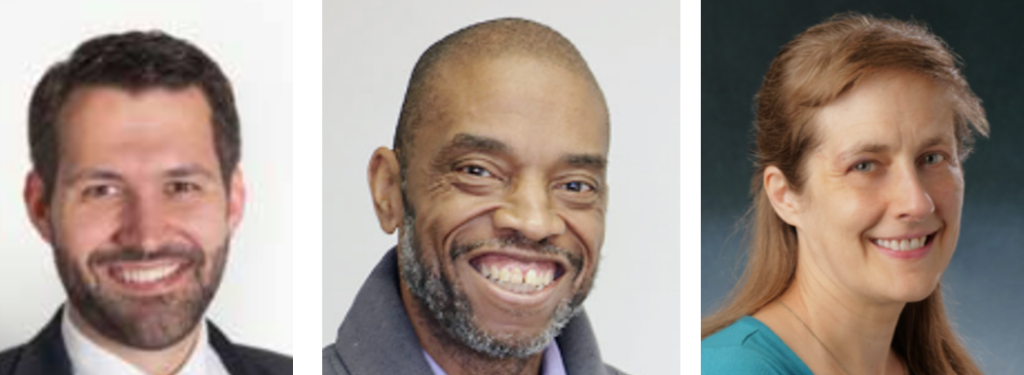
THE PROBLEM: The Right to Vote is being challenged on several fronts across the nation, including:
–restrictions on opportunities to register to vote and to cast ballots
–long lines and intimidating practices at polling places
–growing politicization of vote-counting and auditing
–unlawful voter purges
–gerrymandering
–inadequate campaign financial reform
GUIDING QUESTIONS for our 90-minute session:
1. What is the scope of voter suppression and disenfranchisement across America?
2. What is the status of pending federal legislation to address the right to vote?
3. What is the history of the right to vote in Colorado? What challenges remain?
4. What constitutes a “fair” district map? What role can mathematics play in the redistricting process?
5. What actions can citizens take to protect and expand the right to vote?
Doug Spencer is an Associate Professor of Law at the University of Colorado. Professor Spencer is an election law scholar whose research addresses the role of prejudice and racial attitudes in voting rights litigation, the empirical implications of various campaign finance regulations, and the ways that election rules and political campaigns contribute to growing inequality in America. He recently shared his views about the Supreme Court’s recent ruling “to uphold two contentious laws in Arizona that impose restrictions upon voting.”
Terrance Carroll is a Senior Fellow (Advisor) for Unite America, “a movement of Democrats, Republicans, and independents working to put voters first by fostering a more representative and functional government. We invest in campaigns to enact reforms and elect candidates so that the right leaders have the right incentives to solve our country’s greatest problems.” Carroll was the 54th Speaker of the Colorado House of Representatives; the only African-American to have served as Speaker of the Colorado House. He served in the legislature from 2003 until being term-limited in 2011.
Professor Jeanne Clelland, Department of Mathematics, University of Colorado Boulder heads a research team of mathematicians, statisticians, and computer scientists working to apply mathematical and data-focused methods to fair redistricting in Colorado. For a brief overview of the team’s work, see the article, Can math make redistricting more fair?“ She said, “I was looking for ways for me to use my professional skills to make a difference and improve the political landscape a little bit. This seemed like an opportunity for mathematicians to get involved and do good work.”
# # #
Two recent articles from the Brennan Center for Justice, a nonpartisan law and policy institute affiliated with the New York University School of Law, are especially relevant for our topic this month:
“Voting Laws Roundup: October 2021” From January 1st through September 27th this year, “19 states have enacted 33 laws that will make it harder to vote..
“The Freedom to Vote Act Is a Big Deal for Districting” Congress has a chance to save this cycle of redistricting, but it needs to act soon.
VIDEO recording (click here)
Presentation slides:
- Jeanne Clelland slides: Redistricting and Gerrymandering: When is a district map “fair”? (click here)
- Pertinent to today’s forum: Republicans Gain Heavy House Edge in 2022 as Gerrymandered Maps Emerge
.
October 18th, 2021
“How Spend $500 Million from Coronavirus Funds for Colorado Housing Needs?”
The Honorable Steven Woodrow, State Representative (District 6),
Colorado General Assembly
Alison George, Housing Director
Colorado Division of Housing, Colorado Dept. of Local Affairs
Cathy Alderman, Chief Communications & Public Policy Officer,
Colorado Coalition for the Homeless
Steven Cordova, Executive Director, Total Concept

Sponsored by the Ethics and Ecological Economics (EEE) Forum
State legislation was enacted earlier this year that outlines the process for allocating more than $500 million in federal coronavirus funds “for programs or services that address housing insecurity, lack of affordable and workforce housing, or homelessness . . .” House Bill 1329 has already allocated approximately $100 million to the Colorado Department of Local Affairs for use by the Division of Housing in the current fiscal year 2021-22. Allocating the remaining $400 million will be taken up by the legislature, beginning in January.
This legislation calls for the creation of a task force “to meet during the 2021 interim and issue a report with recommendations to the general assembly and the governor on policies to create transformative change in the area of housing using money the state receives from the federal coronavirus state fiscal recovery fund . . .” In July, a bipartisan group of 10 legislators was appointed, including Steven Woodrow, one of the four prime sponsors of House Bill 1329. Six leaders from three key state agencies were also appointed to serve, including Alison George.
Three important highlights of House Bill 1329: First, the task force is to focus on housing policies—not drafting legislation: “The task force shall not submit bill drafts as part of their recommendations.” Second, the 2022 legislature “ shall also review recommendations for such policies submitted by the strategic housing working group [SHWG] assembled by the department and the state housing board . . .” The SHWG’s 59-page final report, Affordable Housing Policy Recommendations, was released in July. And third, the House Bill allows the task force to “create working groups to assist them.” In July, legislative leaders appointed 15 members to the Affordable Housing Transformational Task Force Subpanel. Cathy Alderman serves as the Vice chair of the Subpanel. Steven Cordova served on the Strategic Housing Working Group and is a member of the Affordable Housing Task Force Subpanel.
More about our speakers . . .
On February 4th this year, Denver attorney Steven Woodrow was appointed to the Colorado House of Representatives seat representing the 6th district, following the resignation of Chris Hansen to fill Lois Court’s vacancy in the Colorado Senate. Rep. Woodrow is one of the four prime co-sponsors of HB 21-1329. He also co-sponsored another bill that expands those who are eligible to benefit from the rental assistance and tenancy support programs to include individuals experiencing homelessness. In addition to his consumer law practice, Woodrow finds time to coach flag football at South High School on Sundays.
Alison George is the state director of housing, serving the Colorado Division of Housing (DOH) in the Department of Local Affairs, where she directs all DOH programs, ranging from statewide housing voucher programs and manufactured housing code and mobile home park regulatory oversight, to Federal and State funding for constructing new affordable housing. Before joining DOH, Alison served Mercy Housing Colorado as its Regional VP of Multifamily Housing and the Michaels Development Company as its VP of Development, overseeing housing development in Colorado, Missouri, Kansas, Oklahoma, and Texas.
Cathy Alderman is the Chief Communications and Public Policy Officer for the Colorado Coalition for the Homeless (CCH) and oversees the Education and Advocacy Team. During her five years at CCH, she has successfully advocated for state and local housing resources—resulting in first time housing and homelessness investments by both Denver and Colorado state government. Before joining CCH, Cathy served as the Vice President of Public Affairs for Planned Parenthood of the Rocky Mountains (PPRM) and the PPRM Action Fund—overseeing policy, political, and community engagement work for a four-state region.
Steven Cordova serves as Executive Director of Total Concept, a nonprofit organization providing housing and community development in over 20 Colorado counties, primarily in southeastern Colorado. Under Cordova’s leadership since 2010, Total Concept has grown significantly in its Housing Services, apartment units, geographical service area, and staff. Prior to Total Concept, Steve was the CFO for thirteen years of a Behavioral Health Group, Administrative Services Director for a Community Health Center, and at a CPA firm for over 5 years. He is dedicated to community engagement by serving on several boards for local, state, and national organizations.
VIDEOs IN 2 PARTS:
-
- Intro by David Carlson VIDEO LINK
- Late Start to presentation: Steven Woodrow followed by Alison George, Cathy Alderman and Steven Cordova: VIDEO LINK
Presentation slides:
- Rep. Steven Woodrow: Affordable Housing for all Coloradans (click here)
- Alison George: DOLAs Division of Housing, Federal and State Stimulus Funds (click here)
- Cathy Alderman: SubPanel to the Affordable Housing Transformational Task Force (click here)
- Steven Cordova: AHTTF and SHWG – Practitioner in Rural & Remote Colorado (click here)
September 20th, 2021
“Digital Equity in Colorado: High-Speed Internet Access and More”
A recording of this September EEE Forum on “Digital Equity in Colorado: High-Speed Internet Access and More” is now available on YouTube at https://youtu.be/lHdMjxNlWVA.
Initial recommendations to increase digital equity in Colorado are being developed by the Subcommittee on Digital Literacy and Inclusion [SDLI] this fall. These preliminary recommendations will be submitted to the Broadband Advisory Board in December. To learn more and get involved, visit the SDLI webpage.
Antonio Martinez, Executive Director, Colorado Broadband Office,
Governor’s Office of Information Technology
Susan Hakanson, Executive Director
Durango and Cortez Adult Education Centers
Michael Bevis | Innovation and Entrepreneurship
Denver Economic Development and Opportunity
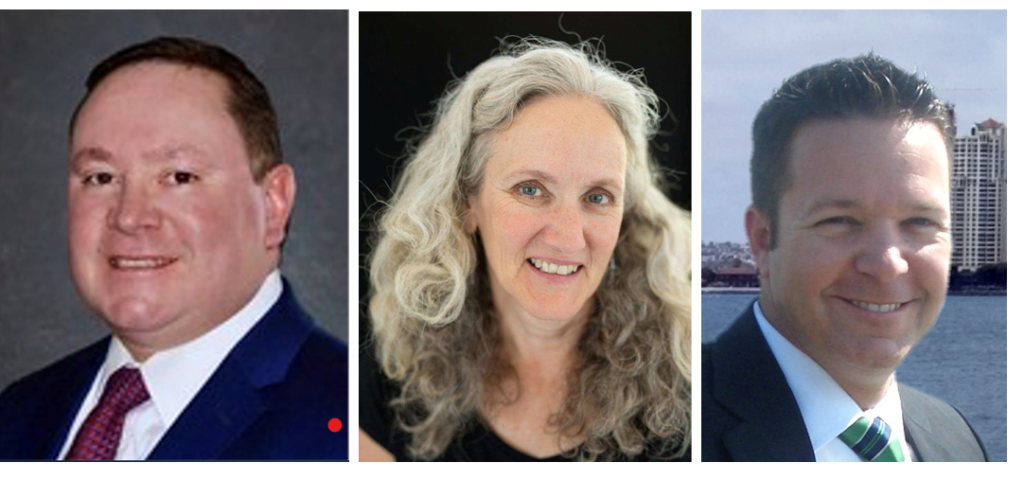
Digital Equity is a state in which all individuals and communities have the information technology capacity needed for full participation in our society, democracy and economy. Digital Equity is necessary for civic and cultural participation, employment, lifelong learning, and access to essential services.
—National Digital Inclusion Alliance
The three key components of digital equity include:
- Access to affordable, high-speed internet
- Access to affordable, web-enabled technology
- Access to relevant and high quality, effective training and support for digital skill development and use
—Digital Literacy and Inclusion Initiative, Colorado Dept. of Labor & Employment
Antonio Martinez is the second-ever Executive Director to lead the Colorado Broadband Office, which is in the Governor’s Office of Information Technology. When appointed to this position in Feb. 2021 he noted, “Becoming Executive Director of the Colorado Broadband Office is an absolute privilege. It allows me to focus my years in public service on providing vital broadband to the underserved communities in my native state.” A fifth generation Colorado native from the San Luis Valley, Antonio has served in a myriad of military service and federal leadership positions. He is now continuing the state’s efforts to grow strong public and private sector relationships in communities to support broadband expansion throughout Colorado. Learn more about Antonio here.
Susan Hakanson has served as Executive Director of the Durango and Cortez Adult Education Centers since 2019. She also serves on the Policy Working Group of the statewide Digital Literacy and Inclusion Subcommittee. “A Colorado native, Susan brings extensive experience in public relations, grant writing, fundraising, communications, as well as project and fiscal management to the [Durango] Center. She served on the Roaring Fork School District Board for nearly a decade with many terms as its president. She attended Fort Lewis College and earned a Masters in public policy and leadership from the University of Colorado Denver.” —The Durango Herald (8/21/2019).
Michael Bevis is an entrepreneur and business professional who is driven to help others reach their full potential. His talents and experiences encompass business marketing, leadership, personal branding, and higher education. Michael is an industrial and organizational psychologist with additional graduate degrees in finance and marketing. Michael currently manages all things related to entrepreneurship and innovation for the city and county of Denver. He also is leading the development of Denver’s Digital Equity Plan. Michael also is the founder and CEO of KoolSkinz, a pet product company specializing in Pet Performance Wear. He has started three non-profits and serves as a board member for several others.
May 24th, 2021
Food Systems and Food Insecurity in Colorado
Becca Jablonski, Food Systems Economist, Colorado State University
Wendy Moschetti, Director of Strategic Initiatives, Nourish Colorado
Julia Char Gilbert, Policy Analyst, Colorado Health Institute
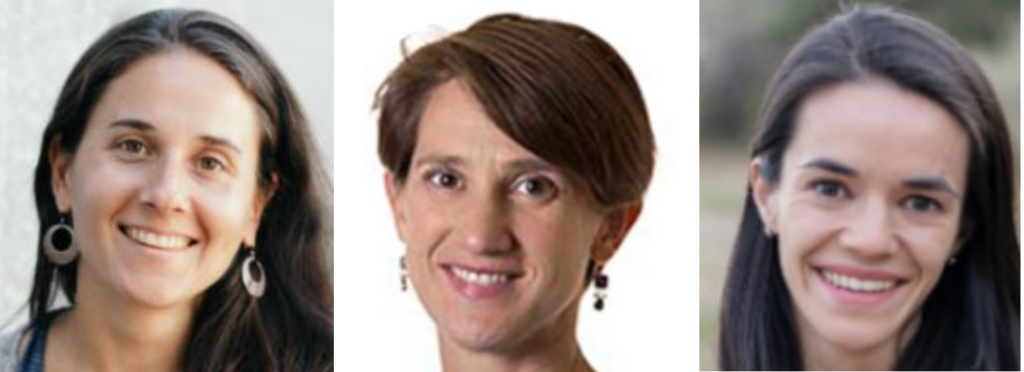
“Food systems are defined as the connections between natural resources, the agricultural and food industry, and the buyers, consumers and communities to which they contribute.”
Colorado State University Food Systems Initiative
Dr. Becca Jablonski is an assistant professor and food systems economist at Colorado State University, and co-lead of CSU’s Food Systems Initiative. The Food Systems Initiative bridges research, extension and education to identify and inform opportunities to bridge how the production, supply chains, and eaters respond to changing markets, policy, and environment. “Many [CSU] faculty . . . have been working to evaluate what types of urban food policies, programs and initiatives support farmers, ranchers, regional communities and economies. . . . We have been working to take a systems approach, looking at economic, social, and environmental impacts and tradeoffs.”
As the director of strategic initiatives, Wendy Peters Moschetti leads the development and implementation of Nourish Colorado’s strategies related to food systems, food access and food promotion. Wendy launched her own firm, WPM Consulting, in May 2009. Since then, she has collaborated with numerous organizations—including LiveWell Colorado (now Nourish Colorado), LiveWell communities across the state, Colorado State University, Rocky Mountain Farmers Union, Hunger Free Colorado, and the Colorado Department of Public Health and Environment—to work on a variety of projects aimed at leveraging our food systems to improve equitable access to healthy foods.
Julia Char Gilbert is the lead author of the Colorado Health Institute’s recent report, An Uneven Burden: Food Insecurity in Colorado. As a CHI policy analyst since 2019, she conducts research, analysis, and evaluation on issues such as food insecurity, school-based health care, and the direct care workforce. Julia also analyzes Colorado policy and politics as a member of CHI’s legislative services team. Julia holds a bachelor’s degree in political science from Yale College, where she concentrated in health and justice.
RELATED RESOURCES
** The Colorado Food Systems Coalition is a group of several organizations that work to strengthen healthy food access for all Coloradans while supporting Colorado agriculture, communities and economies.
** At the state level, the Governor-appointed Colorado Food Systems Advisory Council works to advance recommendations that strengthen healthy food access for all Coloradans through Colorado agriculture and local food systems and sources. (Wendy Moschetti is a member of the Council.)
- The Advisory Council’s website includes several “White papers” on such issues as “Colorado’s agricultural workers,” “Improving healthy food retail for Coloradans,” and “Preparing for Food Security in an Age of Limited Natural Resources” (Water, Land Use, and Energy).
** The 40-page report of the Colorado Blueprint to End Hunger.
** “The Facts: Hunger and Poverty in Colorado” from Hunger Free Colorado.
VIDEO recording from the May 24th EEE Forum on “Food Systems and Food Insecurity in Colorado” is now available on YouTube here.
Presentation slides:
- Julia Char Gilbert: An Uneven Burden; Examining Disparities in Food Insecurity in Colorado (CLICK HERE)
- Wendy Moschetti: Nourish Colorado; Transforming Food Systems (CLICK HERE)
- Becca Jablonski: Food Systems and Security During COVID-19 (CLICK HERE)
Monday, April 26th , 2021
“Regenerative Agriculture: Healthy Soils and Working Lands”
Max Neumeyer, Coordinator, Colorado Coalition to Enhance Working Lands
Helen Silver, Principal, Silver Sustainable Strategies, LLC
Lesli Allison, Executive Director, Western Landowners Alliance
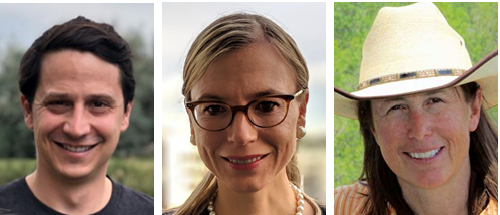
Sponsored by the Ethics and Ecological Economics (EEE) Forum
Regenerative: Regrow — Renew – Restore
Colorado Coalition to Enhance Working Lands: Regenerating Land for a Healthier Future
The purpose of Colorado CEWL (pronounced “Colorado Cool”), a coalition of over 40 organizations, is “to improve the resilience and productivity of Colorado to create viable agricultural businesses and rural communities, protect open space, and increase the ecosystem service benefits these lands provide to the people of Colorado.”
Colorado Collaborative for Healthy Soils
CCHS “is a bottom-up and big-tent organization bringing the agricultural community together around soil health. Over the past year, the Collaborative has brought diverse stakeholders together in order to give input to CDA [the Colorado Department of Agriculture] on a proposed Soil Health Program . . . As a Collaborative, we are committed to being producer-centered, science-based, action-oriented, and to pursue only solutions that are voluntary and incentive-based.” (See the “Colorado’s SOIL HEALTH Resource Guide” on the CCHS website.)
Max Neumeyer is the principal of Ground Up Consulting LLC. He comes to this work after a career as a science teacher and a graduate degree in public policy focused on soil health policy for Colorado. After graduation, he worked with Mad Agriculture and several other partners to launch the Colorado Collaborative for Healthy Soils in order to explore a new direction for soil health. He is now working in close partnership with the Colorado Department of Agriculture, conservation and conservancy districts, Colorado State University, philanthropic and other partners to design, launch and fund a soil health program. Max also coordinates the Colorado Coalition to Enhance Working Lands (CO-CEWL).
Helen D. Silver is the principal of Silver Sustainable Strategies, LLC. Helen’s diverse experience includes US and international environmental law and climate change and food systems policy. Her clients include Colorado State University, Colorado Department of Agriculture, and the Colorado Water Conservation Board. She currently is on the coordination team for the Colorado Collaborative for Healthy Soils coordination team and facilitates its Science and Practice Committee and its legislative efforts. She also facilitates the development of a science-based, regionally specific soil stewardship certification program for Colorado. Within Harvard University Extensions School’s Sustainability Program, Helen co-instructs Assessing the Food-Water-Energy Nexus: Foundations of Global Security and The Role of Soil Health in Creating Sustainable Food Systems.
Lesli Allison is a founding member and executive director of the Western Landowners Alliance, one of the organization partners of Colorado CEWL. For the past three decades, she has worked extensively with private landowners and multiple stakeholders to advance conservation, sustain working lands and support rural communities. Lesli is also a member of the Steering Committee for the Western Ranch Management and Ecosystem Stewardship Program at Colorado State University. She writes:
Farms and ranches “are the last best pieces of intact, fertile, habitable open land. They are the cornerstones of both human communities and the ecosystems we all depend on. And they are disappearing.” – from “Working Lands Are the Future of Conservation”
SLIDES:
- Regenerative Agriculture: Soil Health in Colorado, Max Neumeyer and Helen D. Silver, Colorado Collaborative for Healthy Soils: CLICK HERE
- Advancing Policies and Practices that Sustain Working Lands, Connected Landscapes and Native Species: Lesli Allison, Executive Director, Western Landowners Alliance: CLICK HERE
March 22nd, 2021
“Forests: Lungs of Our Planet and Cities”
Slide links below; video link forthcoming
o How are forests doing in our cities, statewide, nationwide, and globally?
o How important are trees and forests for humans and nature to thrive?
o Specifically, how important are forests in mitigating climate change?
o What can individuals and groups do to protect trees and forest health locally, statewide, nationally, and globally?
*SPEAKERS
Dana Coelho, Urban & Community Forestry Program Manager, Colorado State Forest Service
Jorge Figueroa, Director/Principal, El Laboratorio
Ian Leahy, Vice President of Urban Forestry, American Forests
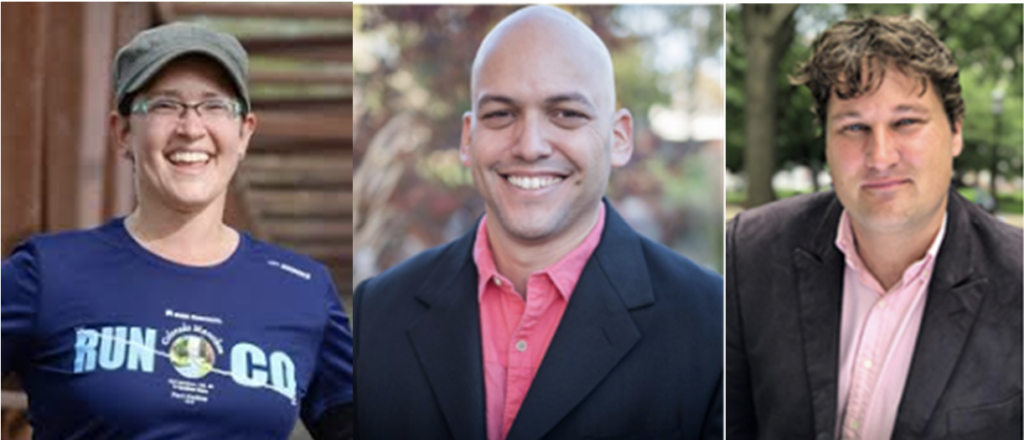
Sponsored by the Ethics and Ecological Economics (EEE) Forum
Dana Coelho is the Program Manager for Urban and Community Forestry at the Colorado State Forest Service. This program assists communities with tree resource management planning, including tree inventories, invasive species response, and caring for storm-damaged trees. The program also provides administration support for the volunteer, nonprofit Colorado Tree Coalition, whose mission is to lead statewide efforts to preserve, renew, and enhance community forests in Colorado. As program manager, Dana is also the Colorado point of contact for information about Arbor Day (3rd Friday in April each year).
Born in the Dominican Republic and raised in Puerto Rico, Jorge Figueroa focuses on helping the people of San Luis Rio Colorado bring back and enjoy their Colorado River in perpetuity; advancing cultural resiliency and resilient food-energy-water systems in Puerto Rico and the Caribbean; and protecting the West’s sacred landscapes for future generations. Prior to founding El Laboratorio, Jorge worked for Western Resource Advocates for eight years as a Senior Water Policy Analyst, developing innovative processes and solutions with and for governors, state agencies, utilities, local communities, and other partner organizations.
As vice president of urban forestry at American Forests, Ian Leahy has led the development of its award-winning program, Community ReLeaf, which has helped more than 20 cities build long-term urban forest management capacity and expand their tree canopy. At the core of the program is a uniquely comprehensive change model, as well as a focus on addressing Tree Equity in lower-income communities. Ian has overseen the development of free national movement building resources, such as Vibrant Cities Lab, a tree care industry career pathways toolkit for low-income people of color, as well as tools to elevate urban forestry in addressing climate change and public health.
Please share this announcement with others who may be interested. For information about the purpose of the EEE Forum and recent themes and speakers, visit the Forum website or contact Forum Founder and Convener David Carlson.
SLIDES:
- Introductory slides by David Carlson: click here
- Dana Coelho: Urban Forestry as a Critical Component of a Thriving Region for People and Nature: click here
- Ian Leahy: Tree Equity in a Warming World: click here
February 22nd, 2021
“Moving Ahead on Climate Change with Diverse Leadership”
Moderator: Isabel Mendoza, Program Manager, The Alliance Center
PANELISTS
Sonrisa Lucero, Sustainability Strategist,
Denver office of Climate Action, Sustainability, and Resiliency
Gabriel Otero, Colorado Plateau Representative, The Wilderness Society
Tezcatli Diaz, Manager of Youth Organizing and Fundraising Advisor,
Project VOYCE (Voices of Youth Creating Equity)

Sponsored by the Ethics and Ecological Economics (EEE) Forum
Isabel Mendoza is Programs Manager for The Alliance Center in downtown Denver. She holds a bachelor‘s degree in ecology and evolutionary biology from University of Colorado Boulder and a master’s in environmental science and policy from Johns Hopkins University. The combination of field work, GIS and her experience growing up in areas with high poverty allows Isabel to understand the nuances of complex environmental issues and to find creative ways to solve them. She writes:
Climate change is the biggest threat that has ever been presented to human life on this planet. Our ability to come together will determine the future for all generations to come. To that goal, it is pivotal for people and organizations to create social justice frameworks that include those in the frontlines of the environmental justice movement.
Please join us in this informal, candid, and open conversation with environmental leaders. Our panelists and I will talk about the importance of fighting climate change while addressing the racism, inequity, and injustice of our current systems. We will discuss the unknown and unintended consequences of privilege and how that affects our work. We will come together to paint a vision for the future and come up with tangible steps to make them come true.
Sonrisa Lucero is the Sustainability Strategist for the Office of Climate Action, Sustainability, and Resiliency for the City and County of Denver where she facilitates the equitable achievement of the city’s sustainability goals through policy development and implementation. With over fourteen years of experience in the private and public sectors, Sonrisa is skilled at building trust and guiding diverse stakeholders to advance sustainability and combat climate change. Sonrisa is a graduate of Stanford University with a self-designed degree combining energy resources, policy and economics in the School of Engineering. She delivered a TEDx Talk in 2020, “Stopping Climate Change Starts with the Heart and Latinx Communities.” Sonrisa is a Denver native and loves exploring the outdoors with her wife Cristina and dog Rio.
At The Wilderness Society, Gabriel Otero works on oil and gas development, land management plans, conservation designations, defending National Monuments and bedrock conservation laws across the Colorado Plateau. Before joining TWS, Gabriel worked on Congressional and Senatorial campaigns. He also worked for five years in the oil and gas energy sector. Gabriel received his BA in Political Science from Colorado Mesa University. He is a 4th generation Coloradan and Next 100 Colorado member.
Tezcatli Diaz is Manager of Youth Organizing for Project VOYCE (Voices of Youth Creating Equity. She is a community organizer and is experienced in legislative processes and campaign building. She served as a legislative aide to State Representative Joseph Salazar and has supported many local and statewide campaigns rooted in social and environmental justice. Tezcatli also worked with youth and volunteers as a Membership Manager at the Girl Scouts Councils of Colorado and Greater Chicago & Northwest Indiana. Currently, she is an active member of the Colorado and National Green Latinos Orgs and serves as the President of the Lynwood Neighborhood Organization. Currently, she is an active member of the Colorado and National Green Latinos Orgs and serves as the President of the Lynwood Neighborhood Organization.
January 25th, 2021
“Moving Ahead on Climate Change: U.S., World, Colorado”
SPEAKERS:
Phil Nelson, Chair, Golden Chapter of Citizens’ Climate Lobby
Robert Youngberg, President and founder, Sustainability Development International
Marie Venner, Co-Chair, Call to Action Colorado and Catholic Network—US;
and Chair, Decarbonization Subcommittee at the National Academies
Sponsored by the Ethics and Ecological Economics (EEE) Forum
Phil Nelson: Candidates for Federal Climate Legislation. Many climate-related bills were introduced during 2020 and will be re-introduced in the 117th U.S. Congress. We will look at three bills of which two were introduced by Colorado members of Congress.
Robert Youngberg: Focusing on overall global progress in addressing climate change, or lack of progress to date, but emphasize the plans and actions of the major CO2 producing countries and regions through 2050, and in particular over the next 10 years.
Marie Venner: Top issues and action around climate change in Colorado and our work leading up to this, since our climate and cross-justice movement conference, ActivateCO in Sept. 2018.
Post-meeting slides and attachments; YouTube video of the January Forum is in production
- Introductory Slide by David Carlson: click here
- Phil Nelson’s Slides: Moving Ahead on Climate Change: World, U.S., Colorado
plus: Energy-Act-of-2020-Overview
- Robert Youngberg Slides: Global Prospects for a Low Carbon Future
- Marie Venner Slides: Click here
November 16th, 2020
“Democracy in a Time of Un-Truth”
SPEAKERS:
Tamim Ansary, Author and Educator
George DeMartino, Professor, Josef Korbel School of International Studies, DU
Lynn Schofield Clark, Professor & Chair, Dept. of Media, Film, & Journalism Studies, DU

Sponsored by the Ethics and Ecological Economics (EEE) Forum
Tamim Ansary writes about history and culture and what happens when civilizations overlap. His latest book, The Invention of Yesterday, is a history of the world that looks at human history as the story of various world historical narratives interacting and intertwining around the planet. Conspiracy Theory is one such narrative. He writes: “My work ranges from history to memoir to fiction. I grew up in Afghanistan and grew old in America. As an Afghan-American writer, I often find myself exploring areas where civilizations overlap and cultures interact.”
George DeMartino is an economist who researches the ethical foundations of economic theory, policy, and professional economic practice. Professor DeMartino is a Past President of the Association for Social Economics and a current board member of the Association for Integrity and Responsible Leadership in Economics and Associated Professions. His newest book is Oxford Handbook of Professional Economic Ethics, co-edited with Deirdre McCloskey. He is now at work on The Tragedy of Economics (University of Chicago Press).
Lynn Schofield Clark is an ethnographer who is interested in how the everyday uses of digital, mobile and social media shape peoples’ identifies and aspirations, particularly in the context of widening income inequality in the United States. Her latest book, co-authored with Ragina Marchi, is Young People and the Future of News: Social Media and the Rise of Connective Journalism (Cambridge University Press). Professor Clark was recently elected President of the Association of Internet Researchers.
Today, our nation and the world face multiple and interconnected crises: climate change, global pandemics, structural racism, and growing socio-economic disparities. What is keeping our democracy from addressing them in a timely and effective manner? Some clues:
**A recent on-the-ground article by Time magazine reporter, Charlotte Alter: “How conspiracy theories are shaping the 2020 election–and shaking the foundation of American democracy”(9.21/28.2020 issue, pp74-77).
Over a week of [more than seven dozen] interviews in early September, I heard baseless conspiracies from ordinary Americans in parking lots and boutiques and strip malls from Racine to Cedarburg to Wauwatosa, Wis.
**Pulitzer Prize winner and New York Times columnist Thomas Friedman recently put it this way:
Without shared facts on which to make decisions, there can be no solutions to our biggest challenges. And without a modicum of trust that both sides want to preserve and enhance the common good, it is impossible to accomplish anything big.
–from “Trump Sent a Warning. Let’s Take It Seriously.” (NYT, 9.29.2020)
SLIDES:
- David Carlson: Introductory slides
- Lynn Schofield Clark: Democracy in a time of Un-truth
- George DeMartino Should Economists Deceive?
- YouTube video link here; Many thanks to Martin Voelker, Forum video specialist and Colorado Renewable Energy Society leader.
- If you wish to contact panelists, please email your request to Forum Founder and Convener David Carlson.
October 12th, 2020
“Election Reform and Ranked Choice Voting”
SPEAKERS: Terrance Carroll, Colorado State Director for Unite America and Linda Templin, Executive Director, Ranked Choice Voting for Colorado
SPEAKER/MODERATOR: Sarah McCarthy, League of Women Voters of Denver
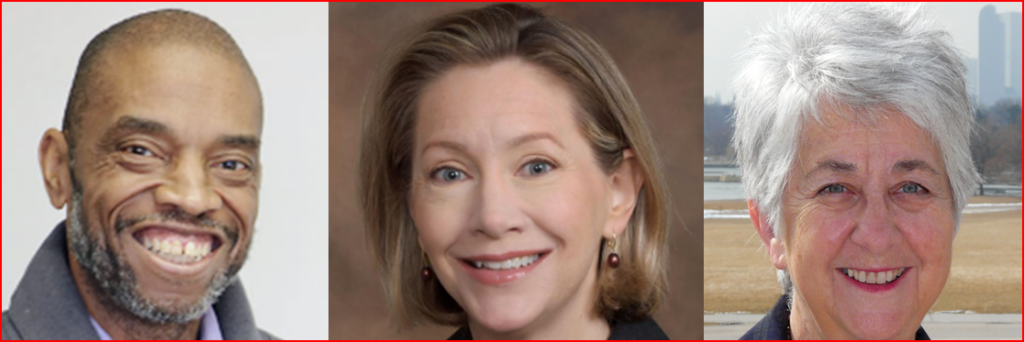
THE PROBLEM: The majority doesn’t always win. “Too often, political candidates are elected without actually winning a majority of votes—or even support—in multi-candidate races where the winner simply has to win more votes than the others. Combined with zero-sum, negative campaigns, and low-turnout runoff elections, the result is a system that leads to unrepresentative outcomes. Ranked Choice Voting can change that.” (uniteamerica.org)
Ranked choice voting (RCV) “is a voting method that allows voters to rank their candidates in order of preference. Instead of choosing just one candidate, voters rank candidates in order of choice—first, second, third, and so on. Voters earn the freedom to vote for the candidates they like the best, without fear of helping elect the candidate they like the least. . . . By implementing RCV in cities and counties across Colorado, we can give voters more choice and more voice in our elections.” (https://rcvforcolorado.org/)
For more information, see Election Reform: Better Methods (League of Women Voters of Colorado) and Ranked-choice voting gains favor in Colorado after primary candidates dropped out late: but first more discussions on logistics and practical applications are needed, officials say” (Denver Post, March 7, 2020).
Linda Templin slides: here
Video link here; Many thanks to Martin Voelker, Forum video specialist and Colorado Renewable Energy Society leader.
September 14th, 2020
“TOWARD A LIFE-CENTERED ECONOMY: From the Rule of Money to the Rewards of Stewardship”
SPEAKERS: John Lodenkamper, Paul Alexander, Pete Baston, Judith Streit
Quaker Institute for the Future Research Group

This life-centered economic system emphasizes “quality of life” over “quantity of stuff.” It implies a more thoughtful use of our time for the things that are truly important, such as, fulfillment of our individual potentials, and our relationships with family, friends and our greater community.
The Quaker Institute for the Future (QIF) [www.quakerinstitute.org] seeks to generate systematic insight, knowledge, and wisdom that can inform public policy and enable us to treat all humans, all communities of life, and the whole Earth as manifestations of the Divine.
–from the book* co-authored by our speakers and whose title is this Forum’s theme:
* TOWARD A LIFE-CENTERED ECONOMY: From the Rule of Money to the Rewards of Stewardship is the 12th and most recent QIF Focus Book. It is available through QIF for $15.00 postpaid from Keith Helmuth at keithhelmuth@gmail.com.
TO DOWNLOAD SLIDE PRESENTATION CLICK HERE
VIDEO LINK HERE
*********************

Please visit other tabs for older archives, past slides and links